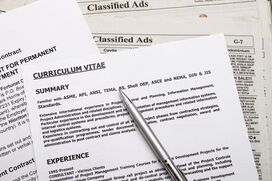
Nail the cover letter with these 3 tips
There's no doubt about it - applying for a job is stressful. Finding relevant postings, touching up your resume and rounding up references can all take a toll, but by far the most hair-pulling part of the application process is writing the cover letter.
Cover letters are an interesting phenomenon in the job market. Everyone knows that they need one, but very few people are aware of why, or what purpose the cover letter should serve. Unfortunately, with so many people vying for the same positions, turning in a less-than-stellar cover letter could be the difference between a job offer and a "thanks for applying." Here are a few tips to help you whip your cover letter into shape.
Do you really need a cover letter?
In an age where candidates frequently apply for up to dozens of positions at once, it can be tempting to skip the cover letter and just focus on the essentials. If you do this, however, you're practically guaranteeing you won't get an offer.
In fact, Lauren Nelson, VP of Aesthetic Cogency, reports that only 40 percent of applicants include a cover letter. Furthermore, only one-fourth of those that do include cover letters tailor their letters to the job they are applying for. Many hiring managers use cover letters to thin the pool of applicants. If you don't send one, you're sending a big message about your work ethic and your commitment to excellence, and savvy employers can pick up on that.
1. Focus on the how, not the what
A good cover letter is more than just a longform recap of your resume. It's a chance for you to highlight some of your most valued achievements. This means you should avoid the format in which you just list what you did at your previous companies. Instead, choose a single accomplishment from your time with the position and explain what you achieved, how you achieved it and what the overall impact on the company was. If your resume provides a history of your work experience, your cover letter is there to make you look good. Don't see it as an extra requirement, but an opportunity to further shine.
"Hiring managers spend an average of six seconds perusing an application."
2. Be attention-grabbing
According to job-search site The Ladders, hiring managers spend an average of six seconds perusing a candidate's applications. That doesn't leave you with much time to state your case. If you want to stand out from the dozens of other resumes sitting on that hiring manager's desk, you need to grab attention.
One way to do this is playing with format - use your cover letter to tell a story, for example. Quotes, humorous sayings or anecdotes can give your cover letter a much-needed sense of humanity in the opening paragraph - just make sure you use this tactic wisely and consider the tone of the company and position you're applying for.
3. Don't use generic cover letters
When you're applying for dozens of jobs at a time, the idea of writing a personalized cover letter for each of them seems daunting. But avoid using generic or boilerplate cover letters, as these stick out like sore thumbs to recruiters who can recognize an obvious template.
That's not to say you have to draft a new letter from scratch each time, but be sure to include information specific to the job or company you're applying to. Highlight achievements that line up with qualities listed on the job posting. The extra effort may yield significant dividends down the road.
 Back to Top
Back to Top

